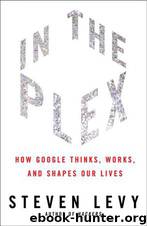In the Plex: How Google Thinks, Works, and Shapes Our Lives by Steven Levy

Author:Steven Levy [Levy, Steven]
Language: eng
Format: epub, mobi
Tags: Non-fiction
ISBN: 9781416596585
Publisher: Simon and Schuster
Published: 2011-04-12T23:22:54+00:00
PART FIVE
OUTSIDE THE BOX
The Google Phone Company and the Google TV Company
1
“They already hate us—what’s the downside?”
You might say that the seeds of the Google Telephone Company took root right after the company moved out of its Palo Alto office to Mountain View in August 1999. The tenant moving into the space Google vacated was a start-up company named Danger.
Danger’s cofounder, Andy Rubin, was a veteran of Apple in the early 1990s and a fabled start-up called General Magic. He’d started Danger to make a mobile communications device called the Sidekick, less a cell phone than a tiny computer—arguably the first smart phone with a measurable IQ. Instant messaging, not phone calls, was the Sidekick’s main purpose; you held it sideways, slid out a keyboard, and began thumb-punching IMs, which appeared in colorful pop-ups on a bright screen. It became popular with teenagers and rap musicians. The Sidekick’s built-in search engine was Google. “The engineers just liked Google,” he says. In 2002, Rubin was demo’ing the Sidekick for a class at Stanford when someone approached him to tell him how cool it was. That was Larry Page.
A couple of years later, Rubin made it a point to visit Google when he was seeking partnerships and funding for his next start-up. (He’d left Danger, and eventually Microsoft bought the company.) Rubin’s new idea was to create an operating system that would power whole families of smart phones—then give the system to the big network carriers (like Verizon or Sprint) for free. This would save the carriers money, since they wouldn’t have to license an operating system from a company like Microsoft or build their own. (Typically a carrier pays 20 percent of the per-phone cost for an operating system.) The system would be written under the rules of open-source software, with the code available to any software authors who wanted to write applications. Rubin’s plan was to make money by selling back-end services to go with the operating system, such as storage, support, and security. It was the familiar model of giving away the razor and making money on the blades.
Rubin, who was a maniacal robot aficionado—he would haunt the Akihabara district of Tokyo for weird Japanese toys, and build a few of his own—called the company Android. He gathered a team of eight to begin working on a prototype. He had a good contact at the handset manufacturer HTC, which provided him with a top-secret new device that he could use just for demos. After a few months, Android had a working model with a set of slick features such as contacts, email, and a camera. (One nice touch was that Android’s photo software could recognize faces.)
Rubin began pitching carriers in 2004. He also went to the Far East to sell the idea to other handset manufacturers. Even though he was offering something for free, it was a tough sell. The mobile phone world had a profitable business model and was loath to consider disruptive new schemes. He would later
Download
In the Plex: How Google Thinks, Works, and Shapes Our Lives by Steven Levy.mobi
This site does not store any files on its server. We only index and link to content provided by other sites. Please contact the content providers to delete copyright contents if any and email us, we'll remove relevant links or contents immediately.
| Biographies | Company Profiles |
| Economic History |
Pale Blue Dot by Carl Sagan(5007)
The Rules Do Not Apply by Ariel Levy(4968)
Goodbye Paradise(3810)
Ogilvy on Advertising by David Ogilvy(3621)
Liar's Poker by Michael Lewis(3447)
Delivering Happiness by Tony Hsieh(3425)
Into Thin Air by Jon Krakauer(3398)
Purple Cow by Seth Godin(3203)
Rogue Trader by Leeson Nick(3043)
The Social Psychology of Inequality by Unknown(3029)
The Airbnb Story by Leigh Gallagher(2854)
4 - Harry Potter and the Goblet of Fire by J.K. Rowling(2702)
The Mind Map Book by Tony Buzan(2576)
Bossypants by Tina Fey(2531)
Claridge's: The Cookbook by Nail Martyn & Erickson Meredith(2404)
All the President's Men by Carl Bernstein & Bob Woodward(2376)
Six Billion Shoppers by Porter Erisman(2302)
Master of the Game by Sidney Sheldon(2290)
Alibaba by Duncan Clark(2082)
